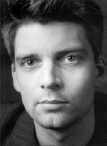

 |
 |
|
 Matthias Pintscher Janusgesicht, On A Clear Day & "a twilight’s song" Matthias Pintscher Janusgesicht, On A Clear Day & "a twilight’s song"Brahms Symphony No 4 & Academic Festival Overture; Mozart Violin Concerto No 5 in A, K219 Philharmonia/Pintscher/Mackerras Royal Festival Hall 5 April 2005 Matthias Pintscher has established his identity as a master of the pianissimo. The prevailing level of his music played in the Festival Hall was so quiet that we were aware of trains passing outside, which I'd thought had been rendered impossible by the (then) innovative architecture. In a revealing talk with Alwynne Pritchard, Pintscher explained that he starts with primordial sounds and timbres, 'catalogues of sound appearances' out of which form in his pieces develops later. He likes simple means with maximum suggestive effect, and referred to the 'talkative quality' of Schumann's music and Mendelssohn's Songs Without Words. Janusgesicht had viola and cello (Vicci Wardman & David Cohen) seeking fusion one with the other, in music 'on the border of soundlessness', ending with an inaudible trill.... On A Clear Day for piano (Shelagh Sutherland) was the hardest to compose, 'pitched based music on a few chords so as not to lose connections'. “a twilight’s song”, a setting of e e cummings, conducted by the composer with flowing movements and a wider dynamic range which still, however, incorporated moments of silence and ppp playing from a sound world that embedded the singer (Julie Moffat) in a haze of bowed percussion and quiet woodwind, the text and voice never dominating.
In Mozart's Violin Concerto No 5 we recalled that it was Mackerras who brought period thinking to the operas; appoggiaturas at Sadlers' Wells many decades ago. I enjoyed the light orchestral playing but found soloist James Ehnes's playing beautiful, indeed a shade too beautiful, if you know what I mean. Mackerras provided a lengthy note about Brahms interpretation, citing Fritz Steinbach on the need for constant flux in the tempo. His Brahms 4 was flexible (he conducts without baton) and had tonal balance that made you sit up. Not For next Music for Today concert June 21st see The Philharmonia's website Next concert in this Mackerras/Brahms series: 10 April 3 p.m. |